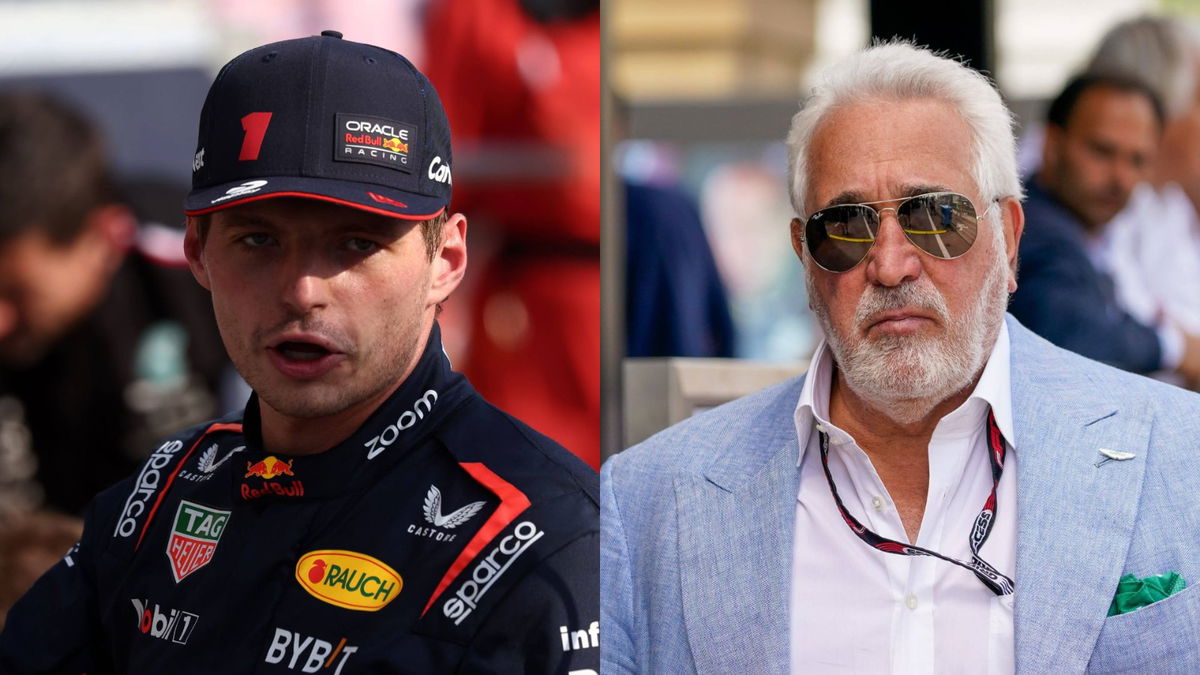
Imago
Image Courtesy: Imago L: Max Verstappen & R: Lawrence Stroll

Imago
Image Courtesy: Imago L: Max Verstappen & R: Lawrence Stroll
Formula 1, a sport known for the highest level of motor racing on the track, finds itself in a race against time. The sport is navigating its way towards environmental responsibility. The journey, however, is far from smooth. Despite F1’s commitment to reaching net zero carbon by 2030, a recent statistic surrounding Max Verstappen and Lawrence Stroll raises questions about the alignment of individual behaviors with the sport’s lofty goals.
Watch What’s Trending Now!
In 2019, F1 unveiled its plan to be Net Zero Carbon by 2030, acknowledging its environmental impact. An extensive report exposed the championship for generating a staggering 256,000 tonnes of CO2 emissions during the 2019 season, the year the sustainability strategy was announced. The push for change required a drastic shift, making environmental considerations a priority in every decision and initiative.
ADVERTISEMENT
Max Verstappen and Lawrence Stroll are far from being aligned with F1’s carbon emission goals
As Formula 1 races towards a greener future, it finds itself at a crucial crossroads. The contrast between the sport’s aspirations and the actions of its key figures is proof of the challenges in reshaping the culture of one of the most glamorous and high-profile sports in the world. The shocking reality is unveiled in the private lives of some of the sports’ big names.
A concerning statistic regarding Max Verstappen and the mileage of his $15 million private jet recently surfaced on X (formerly Twitter). The post highlighted the jet’s journey from Las Vegas to Maine, then to Amsterdam, and finally to Abu Dhabi, covering approximately 9,000 miles in just 24 hours.
Top Stories
Adrian Newey’s Motorsport Masterpiece: RB17 vs Aston Martin Valkyrie, Which One Is Better?

3 Years After His Death, Niki Lauda’s Wife Brutally Disrespects Him to Initiate $32,000,000 Battle Against Own Children

Who Is Canadian F1 Billionaire Lawrence Stroll’s Daughter & Heiress Chloe Stroll?

Who Is Oscar Piastri’s Father, Chris Piastri? Co-Founder of Multibillion Dollar Automotive Company

Fans Dig Up the Past to Troll Famous ‘Monaco Youtuber’ Nico Rosberg After Latest Accomplishment

These revelations position the Red Bull driver as an unwitting poster boy for environmental concerns in a sport attempting to redefine its ecological footprint.
ADVERTISEMENT
Max Verstappen's private jet has put in some serious miles over the last few days.
• Las Vegas to Maine
• Maine to Amsterdam
• Amsterdam to Abu DhabiThe $15 million private jet he purchased from Richard Branson in 2020 covered about 9,000 miles in 24 hours. pic.twitter.com/fLJGkfmcHX
— Joe Pompliano (@JoePompliano) November 21, 2023
Meanwhile, Lawrence Stroll, the owner of the Aston Martin, is also facing intense scrutiny. An investigation revealed that he took a staggering 1,512 flights since the start of 2022. This contradicts the team’s commitment to reducing its carbon footprint. The Guardian’s report identified Lawrence Stroll among 200 celebrities collectively emitting emissions equivalent to almost 40,000 Britons.
ADVERTISEMENT
📰: Lawrence Stroll faces scrutiny after an investigation reveals he took 1,512 flights since the start of 2022, contradicting the team's commitment to reducing its carbon footprint. The report by The Guardian identifies Stroll among 200 celebrities whose private jets… pic.twitter.com/7hzBy312xU
— F1 Naija (@f1_naija) November 22, 2023
In the pursuit of net zero carbon emissions, F1 must grapple not only with the impact during race weekends. But also with the off-track choices of its influential personalities.
ADVERTISEMENT
But does the ever-expanding F1 race calendar reflect its carbon goals?
While F1 pursues the goal of minimizing its carbon footprint, the recent expansion of the race calendar raises a new set of sustainability challenges. The announcement of a record-breaking 24-race calendar [reduced to 23 after China got canceled] in September last year sparked mixed reactions within the F1 community.
Ellen Jones, F1’s head of sustainability since early 2022, saw the ambitious calendar as an opportunity to leverage the platform’s reach for further sustainability plans. However, Jones also acknowledged the immense task at hand. “It doesn’t get bigger from an impact side. Be it from people’s interests, but also from people’s experience. We race around the world. We have an important voice in showing what sustainability can look like in real life in the context of our events. That’s a great opportunity, but a lot of work,” Jones was quoted by Autosport.
ADVERTISEMENT

Getty
BAHRAIN, BAHRAIN – MARCH 10: (EDITORS NOTE: Image has been digitally retouched) The F1 drivers pose for a photo on the grid with their cars during Day One of F1 Testing at Bahrain International Circuit on March 10, 2022 in Bahrain, Bahrain. (Photo by Dan Istitene – Formula 1/Formula 1 via Getty Images)
Jones highlighted the potential for positive change. She suggested that designing events with sustainability in mind could lead to fewer cars and trucks on the road. “If you design things to travel so that they can stack, be lightweight, and [be] more efficient, you can still put on a great show. But you have less cars and less trucks on the road. Hopefully, we have some interest from the teams saying, ah, we’d like to do that and redesign. There are some things we can do and say this is a rule we must follow. But there are other things you can do where you lead by example and say actually, this is a better way of doing things. Please take this on board,” she added.
WATCH THIS STORY | Will Max Verstappen Retire Early from F1?
ADVERTISEMENT
The recent revelations surrounding Verstappen’s and Stroll’s private jet mileage indicate that F1’s journey to net zero carbon is not solely the responsibility of the sport itself. Every individual involved, from drivers to team owners, must actively contribute to making this ambitious goal a reality.
ADVERTISEMENT
ADVERTISEMENT
ADVERTISEMENT

